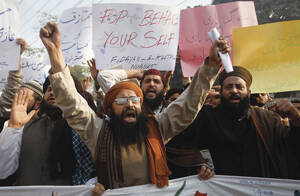Religious freedom and diversity are not threats to society and should not be a source of conflict, Pope Benedict XVI told diplomats from around the world. The meeting on Jan. 10 continued the pope’s Christmas-season focus on the connection between religious liberty and peace and on threats to full religious freedom in Western democracies as well as in countries notorious for violating human rights.
Pope Benedict deplored recent attacks on Christians in Iraq, Egypt and Nigeria and expressed concern about the recent renewal of Chinese government restrictions on Catholics there. He also condemned the murder on Jan. 4 of Salman Taseer, the governor of Punjab in Pakistan. The pope said Pakistan must overturn its blasphemy law, which makes insulting the Prophet Mohammed or the Koran punishable by death. Taseer had supported the move to abrogate the law. Pope Benedict said the law often “serves as a pretext for acts of injustice and violence against religious minorities.”
In Pakistan Hafiz Hussain Ahmed, an influential Islamic leader, suggested that Pope Benedict XVI mind his own business. “The pope has given a statement today that has not only offended the 180 million Muslims in Pakistan; it has also hurt the sentiments of the entire Islamic world,” Ahmed said. Punctuating the pope’s message, on Jan. 11 Iranian authorities revealed that they had arrested 70 Iranian Christians since Christmas, denouncing them as “hardliners” who pose a threat to the Islamic state.
The pope asked the representatives of 178 countries to examine how well their own countries respect the right of individuals to believe, to act in accordance with their conscience, to gather with other believers for worship and to carry out the educational and social projects their faith inspires. Pope Benedict told the diplomats that when religious believers are free to practice their faith, society benefits from an increase in upright behavior, respect for others and solidarity with the poor and weak. Discussing threats to full religious freedom in Western democracies, the pope expressed concern about efforts to push religion to the margins of public life or to deny citizens the right to act in accordance with their religious convictions, “for example where laws are enforced limiting the right to conscientious objection on the part of health care or legal professionals.”
Pope Benedict also condemned educational programs that “mandate obligatory participation in courses of sexual or civic education” with content opposed to Catholic teaching. Church leaders and Catholic parents in Spain have objected to a public school curriculum that presents homosexuality and abortion in a positive light.
The pope told the diplomats that there is no such thing as a “scale of degrees of religious intolerance,” on which a certain amount is acceptable. It is not permissible to infringe on freedom of conscience out of concern to uphold “other alleged new rights that, while actively promoted by certain sectors of society and inserted in national legislation or in international directives, are nonetheless merely an expression of selfish desires lacking a foundation in authentic human nature,” the pope said.
Frederico Lombardi, S.J., the Vatican spokesman, said those “alleged new rights” included a woman’s right to choose to have an abortion and the right of homosexual people to marry and adopt children.








